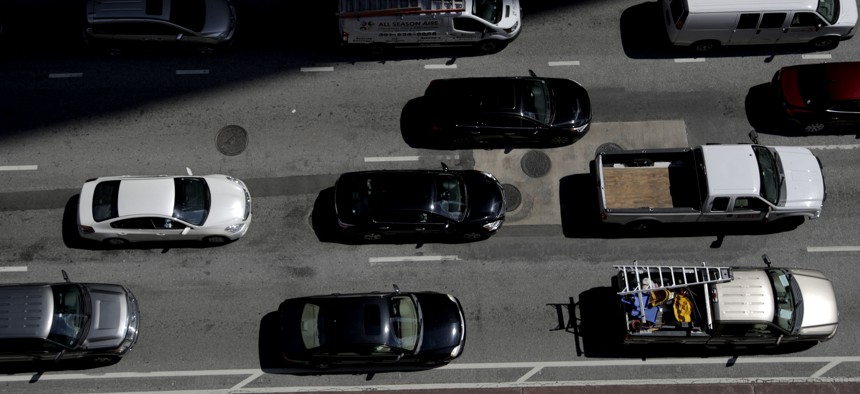Trump Administration Issues Final Auto Emissions Rollback

In this July 2, 2019, file photo vehicles wait for a green light in downtown Baltimore. AP Photo/Julio Cortez
The new standards will require automakers to reduce vehicle emissions by 1.5% each year, as opposed to 5% reductions required under an Obama-era rule.
The Trump administration on Tuesday finalized its rollback of Obama-era vehicle fuel efficiency standards, a move that will still require auto manufacturers to reduce vehicle emissions but at a slower pace.
The Safer Affordable Fuel-Efficient (SAFE) Vehicles Rule will set new standards for vehicles’ carbon dioxide emissions, requiring automakers to reduce emissions by 1.5% each year through 2026. Cars and light trucks are projected to average 40.4 miles per gallon under the new rules.
Standards enacted by President Obama would have required 5% reductions each year and resulted in an average of 46.7 mpg fuel efficiency.
Administration officials said the move will make new cars cheaper and more accessible for American consumers. But environmental groups countered they will result in more air pollution.
“Our final rule puts in place a sensible one national program that strikes the right regulatory balance that protects our environment, and sets reasonable targets for the auto industry,” said Environmental Protection Agency Administrator Andrew Wheeler. “This rule supports our economy and the safety of American families.”
In its initial proposal to roll back the Obama-era standards, the EPA would have frozen fuel efficiency standards at 37 miles per gallon through 2025.
States were previously able to adopt more stringent vehicle emissions standards than the federal standard. For more than 50 years, California had obtained federal waivers that allowed the state to set its own vehicle emissions standards. At least 13 other states had also adopted California’s standards. Because of the large auto market in California, the state’s standards became de facto standards for car and truck manufacturers who want to sell vehicles in the United States.
The Trump administration sought to resume control of setting national standards last year by revoking California’s waiver.
California and 22 other states filed a lawsuit over the revocation, which remains pending in federal court.
Administration officials said the revocation of California’s waiver would create more certainty for automakers by establishing uniform standards across the country. But some automakers were already embracing California’s standards, with BMW, Ford, Honda, and Volkswagen announcing an agreement last summer to improve their vehicles’ gas mileage.
The Alliance for Automotive Innovation on Tuesday said the auto-trade group was still reviewing the rule. But President and CEO John Bozzella said the industry needs policy “that drives not only fuel economy improvements, but that also supports the infrastructure, market, and other conditions necessary for the transformation of light-duty vehicles to a lower- and net-zero carbon future.”
The EPA and Department of Transportation, which together drafted the rules, said the new standards would reduce regulatory costs in the auto industry by as much as $100 billion by 2029 and cut the average price of a new vehicle by about $1,000.
Sen. John Barrasso, the chairman of the Senate Committee on Environment and Public Works, praised the move saying the Obama-era rules would have limited consumer choice because they required auto makers to produce electric and hybrid vehicles, which remain unpopular in rural areas like his home state of Wyoming.
“Washington must consider what is best for the whole country,” the Wyoming Republican said. “The government shouldn’t make rules that work in cities but not in rural communities.”
But environmental advocacy groups said the new rule was a win only for oil companies, as vehicles will be less fuel efficient and cars will require more gasoline. An analysis by the Natural Resources Defense Council found that Americans will consume an added 78 billion gallons of fuel under the new fuel efficiency rules.
“Gutting the clean car standards makes no sense,” said Gina McCarthy, president and CEO of the NRDC. “It will harm the air we breathe, stall progress in fighting the climate crisis and increase the cost of driving.”
Sen. Tom Carper, the ranking Democrat on the Senate Committee on Environment and Public Works, said the rollback could also negatively affect Americans’ health amid the coronavirus outbreak.
“The SAFE Vehicles rule will lead to dirtier air at a time when our country is working around the clock to respond to a respiratory pandemic whose effects may be exacerbated by air pollution,” said the Delaware Democrat. “The reality is that this rule will lead to more greenhouse gas emissions, more premature deaths and higher consumer costs.”
OTHER STORIES on Route Fifty:
NEXT STORY: Amid Closures, Libraries Find New Ways to Provide Services





